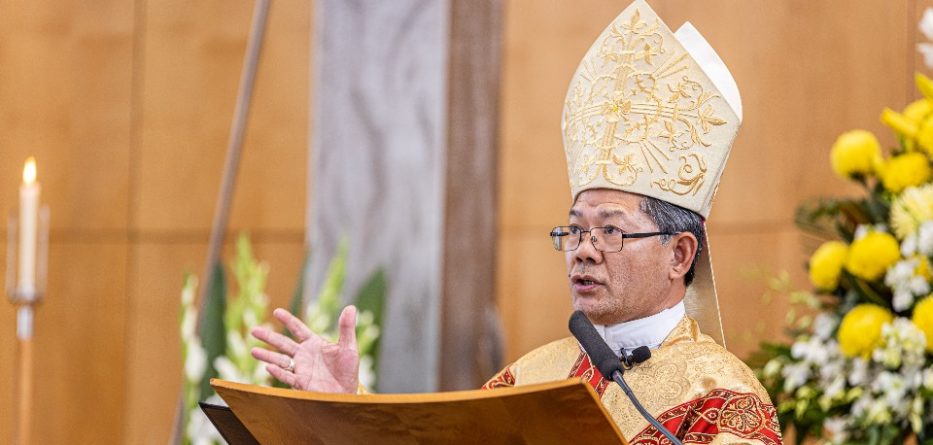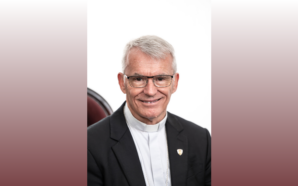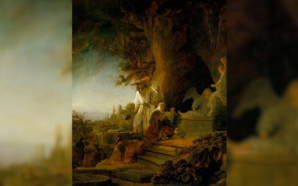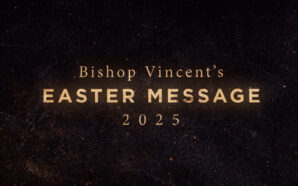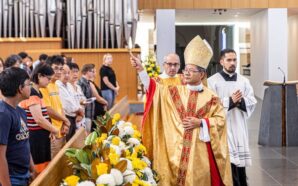Most Reverend Vincent Long Van Nguyen OFM Conv DD STL, Bishop of Parramatta
Homily for the Mass during the Day on Christmas Day at St Patrick’s Cathedral, Parramatta.
Readings: Isaiah 52:7-10; Psalm 97(98):1-6; Hebrews 1:1-6; John 1:1-18
25 December 2022
The incarnate God binds us in solidarity and stewardship
Dear brothers and sisters,
“A light that shines in the dark, a light that darkness could not overpower”. These words of St John are pertinent to us as we come to celebrate the birth of Christ, our joy and hope. No matter who we are and where we are on the journey of life, we are joined in the belief that God is with us in the flesh and in the world. United together, we are strengthened in our commitment to live the radical and subversive way of God revealed to us through the mystery of his incarnation. In these troubled times, when war threatens global security, populism undermines democracy, social inequity fosters mistrust and division, our faith in the incarnate God binds us in human solidarity and stewardship of all creation. For the birth of the child Emmanuel symbolises God’s commitment to the world.
This is what we endeavour to do as a Gospel-centred community. The Church at its best is the embodiment of the divine project. As followers of Christ, we are called to act as catalysts for the transformation of the world in accordance with God’s plan. We are not meant to be comfortable with the status quo, but to model a new way of living and relating that is in sync with the movement of the living spirit. We are inspired to be a leavening force and a headlight leading the human community to higher levels of justice, inclusion and flourishing for all.
On this solemn day, God’s Word assures us that darkness no longer has the upper hand. The world is no longer condemned but redeemed. God’s plan for us has become a reality even as the child is vulnerable and threatened. The seed of hope once sown will grow and realise its potential. The path to victory is inevitable; God’s plan set in motion in the birth of the Emmanuel is unstoppable.
In the first reading, Isaiah speaks of the coming of Messiah who would inaugurate a new reign of justice and integrity. The prophet engenders hope in the people who have been living in exile. It was a time of profound despair as they witnessed the occupation of the promised land, the destruction of the temple and the subsequent captivity. Isaiah announces a time of consolation and restoration for his long-suffering people. He assures them that the imperial ideology will be replaced by the new social order that favours the disadvantaged and the weak. The Messiah will be manifested as a Prince of Peace who will restore the exiled and dignify the oppressed. This prophecy, in effect, subverts the script of the empire and points to God’s vision of a new world through non-violence, solidarity and distributive justice.
St John writing some 800 years later describes the birth of Jesus not only as a human being but as the crowning enfleshment of all that exists. The incarnation is God revealing himself in the flesh of the Christ child that encapsulates the materiality of all creation. Hence, John declares that “all that came to be had life in him” and “He was in the world that had its being through him”. The incarnation is God’s total ‘yes’ and unconditional love for us and for all his creatures.
Christmas opens us to the dawn of this new era of God’s justice, love and compassion in Christ. The trickle-down economy that favours the rich and disadvantages the poor can no longer be the only viable option. Christmas calls us to place the care of the vulnerable and the stewardship of all God’s creation at the centre of human endeavour. A new ethic of communion not just among humans, but with all life forms, must guide our way of life. Thus, Pope Francis warns us that “a technological and economic development which does not leave in its wake a better world and an integrally higher quality of life cannot be considered progress”.
Christmas, then, challenges us to embrace vulnerability, not invincibility, communion, not dominion and downward mobility, not upward mobility. We marvel at the Creator God who enters into the chaos and fear of our world. We are taken aback by the disarming presence of the Child Emmanuel who is surrounded by the lowliest people and the lowliest environment. It epitomises the upside-down way of God. It subverts our way of thinking and acting. Yes, Christmas is God’s race to the bottom.
My dear friends,
As God breaks ranks and becomes vulnerable for us, so must we have the courage to leave our comfort zones and discover the presence, the beauty, the love of God in unfamiliar places, in the margins and the shadows of life. We cannot worship the Christ child in truth without honouring him in the needy, the poor and the marginalised. We cannot be part of God’s new future if we continue to subscribe to the imperial ideology of dominion, consumption and exploitation.
The birth of Jesus signals God’s alignment with those who are at the edges of society. Only by caring for them and for all creation, can we embody the incarnate God. Let us pattern our lives on the self-emptying God who, as the letter to the Hebrews says, sustains the universe. Let us learn to adopt a radical new way of relating and living that facilitates the diversity, harmony and sustainability of all of life. Let us commit ourselves to pray and work for justice in all its manifestations so that God’s reign will come in our world.




